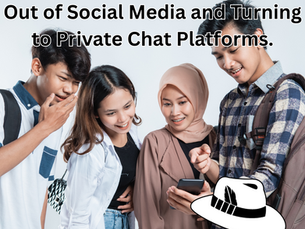top of page


Meta - Instagram, Messenger, and Facebook: Teen Accounts and New Protections, What Parents Need to Know
Fewer than half of parents use built-in parental controls, yet these tools help reduce online risks. Meta’s new Teen Accounts on Instagram, Facebook, and Messenger add protections like private profiles, restricted messaging, nudity blurring, and parental oversight. Helpful but not foolproof, - active, informed parenting remains the strongest safeguard.

The White Hatter
Aug 317 min read


Nova Scotia Liberal Party Pushing For Age Gating Social Media Legislation: A Reasoned and Cited Rebuttal
Nova Scotia’s proposed ban on social media for anyone under 16 is being framed as protection, but the reality is more political than practical. Fear-driven messaging without credible evidence risks doing more harm than good. Parents, not politicians, are best placed to decide when their child is ready.

The White Hatter
Aug 2913 min read


Age-Gated Social Media Legislation: Things That Make You Go Hmmmmmm
Governments push 18+ social media bans to “protect youth,” but teens already drive, consent to medical care, and even join the military. Age-gates risk privacy breaches and push kids to unsafe workarounds. Real safety means parental guidance, digital literacy, and safety-by-design and it this article we explain the "why".

The White Hatter
Aug 269 min read


Could Canadian Families End Up Paying the Price for AI Data Centre Energy Use?
Every month, families open their utility bills and brace for another increase. Meanwhile, data centres powering artificial intelligence are consuming electricity on a scale that rivals entire cities. The question parents need to ask is simple, "should households carry the cost of corporate energy demands?"

The White Hatter
Aug 233 min read


Preparing Youth for AI: Why Principles Matter More Than Platforms
AI headlines seem endless, new chatbots, image generators, and smart glasses arrive almost daily. For parents and teachers, it can feel like drinking from a firehose. The real challenge isn’t memorizing every tool but teaching kids timeless principles of safety, security, and privacy that prepare them for whatever comes next.

The White Hatter
Aug 234 min read


What Not to Post Into ChatGPT As A Teacher: Some Thought for Educators and School Administrators
Educators are turning to ChatGPT to save time and inspire creativity, but not everything belongs in a prompt. The article highlights risks of sharing student data, staff info, tests, or copyrighted material, and offers safer alternatives. Key message: share ideas, not identities, and model responsible AI use.

The White Hatter
Aug 208 min read


Back to School Sleep: Why Parents & Caregivers Should Reset Routines Before the First Bell Rings
Imagine sending your child off to school feeling like they’ve just stepped off a red-eye flight, groggy, irritable, and struggling to focus. That’s what happens when summer sleep habits collide with the first week of school. The best way to prevent this “school-year jet lag” is to start resetting routines now.

The White Hatter
Aug 164 min read


Big Tech, Parents, Caregivers, Legislation, & Real-World Harm, Would We Accept This in Any Other Industry?
Big Tech platforms often ignore online child exploitation while facing little accountability, something no other industry would get away with. This article urges parents, lawmakers, and companies to step up, share responsibility, and push for real legislative action that prioritizes youth safety online but also protects everyones privacy

The White Hatter
Aug 76 min read


Android Privacy Settings You Should Review Right Now
Most Android phones don’t come with top security settings turned on. This guide shows you how to enable key features like Find My Device, Theft Protection, Play Protect, Lockdown Mode, and more. With just 10–15 minutes, you can boost your phone’s privacy, safety, and peace of mind.

The White Hatter
Aug 33 min read


Book Review - Tech Smart Parenting: How to Keep Your Kids Happy & Safe Online"
Tech Smart Parenting” by Catherine Knibbs is the best book we’ve read in a long time on youth, digital literacy, and online safety. Backed by research and real-world experience, it offers clear, practical guidance and a refreshingly balanced approach for any parent or caregiver raising kids in a digital world.

The White Hatter
Aug 13 min read


Why Youth & Teens Need Parents and Caregivers More Than Ever - Artificial Intelligence, Friction, Family, & Relationships
AI is changing how youth learn, connect, and grow, but with few rules and little oversight. This article urges parents, caregivers, and educators to step in. It highlights the risks of unregulated AI, the loss of healthy friction, and the need for thoughtful guidance and stronger regulation.

The White Hatter
Jul 309 min read


How Socio-Economic Access Can Shape Youth Tech Use
Many youth spend hours on screens not because of poor parenting, but due to limited access to offline opportunities. Families with fewer resources often can't afford extracurriculars that compete with screen time. In these cases tech isn’t the enemy inequality and lack of alternatives are the real issues.

The White Hatter
Jul 284 min read


Why Teens Are Starting To Tune Out of Social Media and Turning to Private Chat Platforms.
Many teens are leaving public social media for private chats like Discord and iMessage, tired of AI-generated “slop” flooding their feeds. They want real connection, not content. This shift offers more control and authenticity but also raises new privacy and safety concerns for parents.

The White Hatter
Jul 267 min read


Teen Boys & Consent - We Need To Widen The Lens
Many consent talks focus on boys as boundary-pushers, not boundary-setters. This article challenges that view, urging us to teach teen boys that they too have the right to say no. True consent education must include boys as individuals with feelings, limits, and the right to be heard and respected.

The White Hatter
Jul 236 min read


Why Youth Will Shape Their Online Culture, and Why Digital Literacy Education Still Matters
Adult-led education alone won’t change youth online culture, only youth can. But adults still play a critical role. This article explores how digital literacy, honest conversations, and peer influence empower teens to shape safer, kinder, and more informed onlife spaces from within.

The White Hatter
Jul 135 min read


A Student's Question That Sparked A Prediction
This article explores how AI agents could replace smartphones within the next decade, shifting us from screens to seamless voice and AR interactions. While offering convenience, this shift raises urgent concerns around privacy, autonomy, manipulation, and digital ownership.

The White Hatter
Jul 28 min read


Why We Don’t Recommend AI Toys That Replace Parent-Child Interaction
AI toys that replace real parent-child interaction may seem helpful, but they can disrupt a child’s emotional and social development. Toddlers need human connection, your voice, touch, and presence, to build empathy, trust, and secure attachment. No AI device can replace that. You matter most.

The White Hatter
Jun 304 min read


Understanding Technology, Social Media, and It’s Correlation to Serious Injury or Death In Youth and Teens
Some claim phones and social media are causing thousands of youth deaths each year, but current research doesn’t support that. While some tragic cases exist, the actual numbers are much lower than other youth risks. This article urges proportionate, evidence-based responses and not fear-driven bans.

The White Hatter
Jun 2911 min read


Why We Don’t Promote The “Delay Is The Way” Approach to Tech Safety
Many parents support delaying tech access to protect kids, but total bans may backfire. Home restrictions can’t block every threat. Instead, kids need digital literacy, open communication, and real-world prep to navigate tech safely, because they’ll face it either way.

The White Hatter
Jun 268 min read


How Teens Are Using Technology to Facilitate Digital Relationship Abuse
This article powerfully exposes how teens are misusing technology in relationships to control, monitor, and emotionally manipulate their partners under the guise of care. It challenges harmful digital norms, encourages early conversations about boundaries, and calls on adults to model trust, not surveillance.

The White Hatter
Jun 267 min read
bottom of page
